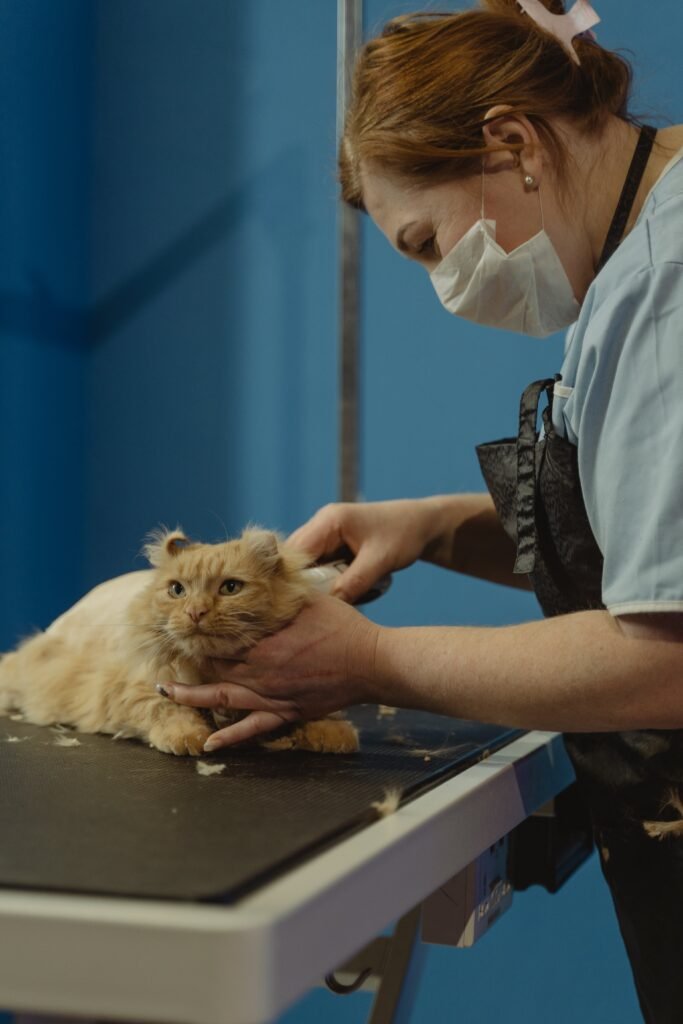Diarrhea in cats is a common issue that many pet owners may face. It can range from a mild, temporary problem to a sign of something more serious. If your cat is experiencing diarrhea, it’s important to figure out why and address it quickly. In this post, we’ll discuss what causes diarrhea in cats, how to treat it, and when you should see a vet.
Causes of Diarrhea in Cats
There are several reasons why a cat might develop diarrhea, and knowing these can help you determine the right course of action:
- Dietary Changes or Food Intolerance: A sudden change in your cat’s food or an ingredient they can’t tolerate can lead to diarrhea. Cats are sensitive to diet changes, so switching food too quickly can upset their digestive system.
- Infections: Bacterial, viral, or parasitic infections can cause diarrhea. Parasites like worms or giardia are common in cats, especially outdoor or newly adopted ones.
- Stress or Anxiety: Cats can get diarrhea from stress, such as moving to a new home, changes in the household, or the presence of new animals.
- Allergies: Food allergies can lead to chronic diarrhea, often accompanied by itching or skin problems.
- Underlying Health Conditions: Conditions like inflammatory bowel disease (IBD), kidney disease, or pancreatitis can lead to diarrhea.
- Medication Side Effects: Some medications, like antibiotics or certain painkillers, can cause diarrhea as a side effect.
Signs and Symptoms of Diarrhea in Cats
It’s easy to spot diarrhea, but it’s also important to watch for other symptoms that may accompany it:
- Loose or watery stools: Diarrhea is marked by a change in stool consistency, becoming soft, watery, or unformed.
- Increased frequency of bowel movements: Your cat may visit the litter box more often than usual.
- Straining: Some cats may strain while trying to pass stool, which can be a sign of discomfort.
- Lethargy or weakness: Cats with diarrhea might seem less active or tired.
- Loss of appetite or dehydration: Prolonged diarrhea can lead to dehydration, so watch for signs like reduced water intake, dry gums, or sunken eyes.
Diagnosing Diarrhea in Cats
If your cat has diarrhea that lasts more than a day or is severe, it’s time to contact your vet. To diagnose the cause, your vet may perform a physical examination and ask about your cat’s recent diet or stress factors. Depending on the situation, your vet may recommend:
- Stool analysis: Checking for parasites or bacteria.
- Blood tests: To rule out underlying health issues like infections or organ problems.
- Imaging (X-rays or ultrasound): If your vet suspects a blockage or more serious gastrointestinal issue.
Treatment for Diarrhea in Cats
The treatment for diarrhea in cats depends on the cause. Here are some common treatments:
- Diet Adjustments: Your vet may suggest switching to a bland diet, such as boiled chicken and rice, or a prescription diet specifically for cats with sensitive stomachs.
- Medications: In cases of infections or inflammation, your vet may prescribe antibiotics or anti-inflammatory drugs.
- Hydration: It’s crucial to keep your cat hydrated, especially if diarrhea persists. Your vet may suggest offering electrolyte solutions or fluids.
- Probiotics: To restore the balance of healthy bacteria in the gut, your vet may recommend probiotics that help with digestion.
Home Care for Cats with Diarrhea
For mild cases of diarrhea, you can manage symptoms at home with these tips:
- Offer Bland, Easy-to-Digest Food: Canned pumpkin (without additives) can help firm up stools due to its high fiber content. Boiled chicken or a veterinarian-approved diet may also work.
- Keep Your Cat Hydrated: Ensure your cat has access to fresh water at all times. If your cat is not drinking, you might try offering water with added chicken broth to encourage hydration.
- Monitor Stool and Behavior: Keep an eye on your cat’s stools and overall behavior. If the diarrhea persists for more than a day or if other symptoms like vomiting or lethargy appear, call your vet.
- Reduce Stress: If stress is a trigger, try to create a calm environment for your cat. This might include providing quiet spaces and keeping routines consistent.
Dietary Considerations for Preventing Diarrhea
To help prevent diarrhea in the future, consider these dietary tips:
- Gradual Food Transitions: When switching your cat’s food, always do it slowly by mixing small amounts of new food with their current diet over 7-10 days.
- Avoid Table Scraps or Human Food: Cats have sensitive digestive systems, and foods like dairy, fatty meats, or anything seasoned can cause digestive upset.
- Choose High-Quality Cat Food: Look for balanced, nutritionally complete cat food that meets your cat’s dietary needs without unnecessary fillers.
When to See a Vet for Diarrhea in Cats
You should contact your vet if:
- The diarrhea lasts for more than 24-48 hours.
- There is blood in the stool, or your cat is vomiting.
- Your cat seems lethargic, weak, or is refusing to eat.
- There are signs of dehydration, such as dry gums or sunken eyes.
These symptoms could point to a more serious underlying condition, and your vet can guide you on the next steps.
Chronic Diarrhea in Cats
Chronic diarrhea, which lasts more than a few weeks, may be due to long-term conditions like inflammatory bowel disease (IBD) or food allergies. In these cases, managing the diarrhea might involve long-term dietary changes or medications. Regular vet check-ups are essential to managing chronic issues and ensuring your cat’s health.
Diarrhea in Kittens vs. Adult Cats
Kittens are more prone to diarrhea due to their developing immune systems and higher risk of parasites. Kittens can become dehydrated quickly, so diarrhea in young cats should be addressed promptly. Always consult with a vet if your kitten is experiencing diarrhea, as they may need immediate treatment.
Conclusion
Diarrhea in cats can be caused by many factors, from dietary changes to infections. While mild cases often resolve on their own, persistent or severe diarrhea needs veterinary attention to prevent dehydration and address underlying health problems. By understanding the causes and keeping an eye on your cat’s behavior, you can help them recover faster and prevent future episodes.
FAQs
1. How long should diarrhea in cats last before seeing a vet?
If your cat has diarrhea for more than 24-48 hours, it’s best to see a vet, especially if they show other symptoms like vomiting or lethargy.
2. Can stress cause diarrhea in cats?
Yes, stress and anxiety can lead to digestive issues like diarrhea in cats, especially after changes in their environment.
3. What home remedies can help a cat with diarrhea?
Bland foods like boiled chicken or canned pumpkin, as well as ensuring hydration, can help with mild diarrhea. Always consult your vet before trying home remedies.
4. Is diarrhea in cats a sign of something serious?
In some cases, diarrhea can be a sign of a more serious condition like an infection, parasite, or an underlying health issue. It’s important to monitor your cat and consult a vet if the diarrhea persists.
5. How can I prevent diarrhea in my cat?
Prevent diarrhea by feeding your cat high-quality food, transitioning diets slowly, and avoiding human food. Regular vet visits can also help catch any potential issues early.


